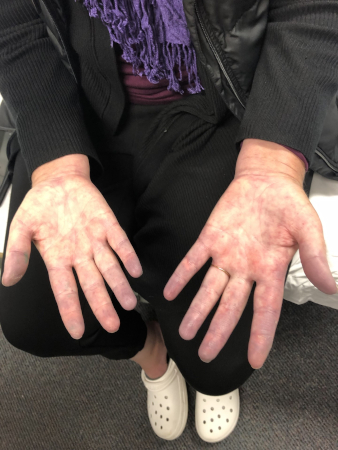Summary
Definition
History and exam
Key diagnostic factors
- presencia de factores de riesgo
- dolor/malestar digital
- parestesia digital
- palidez de los dedos
- decoloración roja y/o azul de los dedos
- capilares del lecho ungueal dilatados
- decoloración bien definida
- aumento del lecho ungueal
Other diagnostic factors
- acidez
- disfagia
- hinchazón de manos
- piel tirante
- artralgia
- fotosensibilidad
- úlceras orales/nasales
- alopecia
- eritema en verspertilio
- esclerodactilia
- telangiectasia
- dolor torácico pleurítico
- úlceras digitales
- fosas digitales
- reabsorción de los penachos distales de las falanges
- gangrena en la punta de los dedos/el dedo entero
- lesiones rojas dolorosas y elevadas en las puntas de los dedos de la mano
- autoamputación
Risk factors
- sexo femenino
- antecedentes familiares
- enfermedad del tejido conjuntivo
- uso de determinados fármacos
- lesión por vibración
- enfermedad de Buerger
- exposición prolongada al frío/congelación
- clima más frío
- tabaquismo
- isquemia
- migraña
- glaucoma
Diagnostic tests
1st tests to order
- diagnóstico clínico
- anticuerpo antinuclear
- hemograma completo (HC)
- velocidad de sedimentación globular
- proteína C-reactiva
- análisis de orina
Tests to consider
- capilaroscopia
Treatment algorithm
Fenómeno de Raynaud (FR) grave secundario: isquemia crítica con úlceras digitales o amenaza de pérdida digital
Fenómeno de Raynaud (FR) primario o secundario leve
Contributors
Authors
Janet Pope, MD, MPH, FRCPC

Professor of Medicine
Division of Rheumatology
Department of Medicine
University of Western Ontario
Schulich School of Medicine and Dentistry
Head
Division of Rheumatology
St. Joseph's Health Care
London
Ontario
Canada
Disclosures
JP has been reimbursed for consulting with several pharmaceutical manufacturers unrelated to Rayaud’s phenomenon. JP’s institution receives research grants from BMS, Janssen, and Seattle Genetics. She has acted as a consultant for AbbVie, Amgen, AstraZeneca, BI, BMS, Celltrion, EMERALD, Frensenius Kabi, GSK, Janssen, JMP, Lilly, Mallinckrodt Pharmaceuticals, Mitsubishi Tanabe Pharma, Novartis, Organon, Pfizer, Sandoz, Samsung, and Viatris. JP is a speaker and advisory board member for AbbVie, Amgen, AstraZeneca, BI, BMS, Frensenius Kabi, GSK, Janssen, JMP, Lilly, Novartis, Organon, Pfizer, Sandoz, UCB, and Viatris. She receives no patents or royalties. JP is an author of a number of references cited in this topic.
Peer reviewers
Elena Schiopu, MD
Professor of Medicine
Rheumatologist
Medical College of Georgia at Augusta University
Charlie Norwood Veterans Affairs Medical Center
Augusta
GA
Disclosures
ES declares that she has no competing interests.
Ariane L. Herrick, MD FRCP
Reader in Rheumatology and Consultant Rheumatologist
Musculoskeletal Research Group
University of Manchester
Manchester
UK
Disclosures
ALH has been a paid speaker for Actelion; a consultant for Actelion and Pfizer; and an investigator in studies sponsored by Actelion, Mediquest, and United Therapeutics. ALH is an author of a number of references cited in this topic.
Bridget Griffiths, MB ChB, MD, MRCP(UK)
Consultant Rheumatologist
Department of Rheumatology
Freeman Hospital
Newcastle upon Tyne
UK
Disclosures
BG declares that she has no competing interests.
Peer reviewer acknowledgements
BMJ Best Practice topics are updated on a rolling basis in line with developments in evidence and guidance. The peer reviewers listed here have reviewed the content at least once during the history of the topic.
Disclosures
Peer reviewer affiliations and disclosures pertain to the time of the review.
References
Key articles
Curtiss P, Svigos K, Schwager Z, et al. Part I: epidemiology, pathophysiology, and clinical considerations of primary and secondary Raynaud's phenomenon. J Am Acad Dermatol. 2024 Feb;90(2):223-34. Abstract
Belch J, Carlizza A, Carpentier PH, et al. ESVM guidelines - the diagnosis and management of Raynaud's phenomenon. Vasa. 2017 Oct;46(6):413-23.Full text Abstract
Kowal-Bielecka O, Fransen J, Avouac J, et al. Update of EULAR recommendations for the treatment of systemic sclerosis. Ann Rheum Dis. 2017 Aug;76(8):1327-39.Full text Abstract
Reference articles
A full list of sources referenced in this topic is available to users with access to all of BMJ Best Practice.

Differentials
- Respuesta normal al frío
- Cianosis/crioglobulinemia
- Sabañones (perniosis)
More DifferentialsDiretrizes
- The 2024 British Society for Rheumatology guideline for management of systemic sclerosis
- EULAR recommendations for the non-pharmacological management of systemic lupus erythematosus and systemic sclerosis
More DiretrizesFolhetos informativos para os pacientes
Abandono del hábito de fumar
Fenómeno de Raynaud
Mais Folhetos informativos para os pacientesLog in or subscribe to access all of BMJ Best Practice
Use of this content is subject to our disclaimer